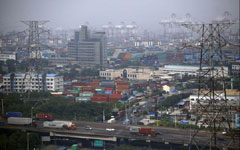China launched the 29-square-kilometer Shanghai FTZ in September to help facilitate the country's economic and financial liberalization. Examples of reforms include liberalization of currency, interest rates and commodity
 |
 |
The zone, which China plans to use as a spearhead for sweeping economic reforms over the next decade, will test new reforms and successful ones will be implemented across the country.
Central to the structure of the reforms is a "negative list" that shows sectors in which foreign investment is banned or restricted within the zone. There are no restrictions on anything not on the list.
Grimstone says the concept of having a negative list demonstrates a fundamental change in thinking by China's policymakers.
"The way my Chinese friends put it to me is that in China everything is forbidden unless it is allowed. And in the FTZ, everything is allowed unless it is forbidden. This is a deep philosophical change."
Grimstone says the change of mentality signifies a freeing up of the Chinese economy, allowing market forces to play a bigger role in driving economic growth. Liberalization of the economy will also significantly contribute to China's growing connectivity with global financial markets.
"I think financial services around the world are about interconnectivity. The reason why London has a larger international financial services industry is because it is an intermediary in the world," Grimstone says.
For example, London as a financial center has more French bankers than Paris and more German bankers than Frankfurt, because having a hub where banks, insurance companies and other financial institutions are close to each other makes business more efficient, he says.
For this reason, many financial transactions taking place in London do not relate to physical investment in the United Kingdom, but do create employment and economic growth for the country, Grimstone says. He believes the Chinese mainland has the potential to become a financial hub for Asia in a similar way.
Although financial centers like Hong Kong and Singapore are currently playing this role, the mainland has the potential to establish its rightful place in the Asian financial markets because it has the unique advantage of being a hub for trade, which is inseparable from financial services.
"Financial centers are interrelated to the economy. The Chinese mainland will achieve its position through the strength of its domestic economy," he says.
Grimstone expects that after successful financial reforms, the state will play a smaller role in the Chinese economy, and this will lead to a big shift in the regulatory environment, with both opportunities and risks. "The issue is, what is to be the relationship between the state and the market, because the state needs to give up
